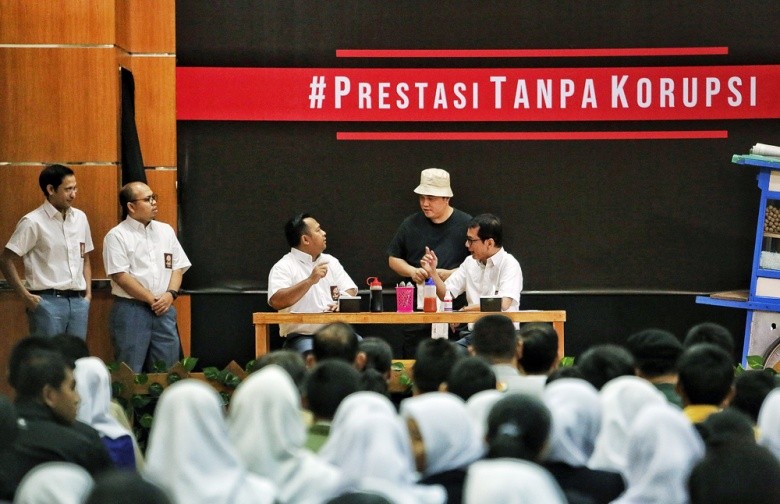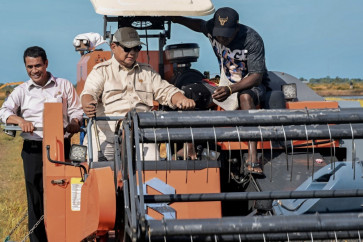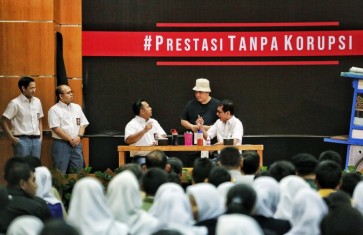Popular Reads
Top Results
Can't find what you're looking for?
View all search resultsPopular Reads
Top Results
Can't find what you're looking for?
View all search resultsHistory test: Jokowi can salvage his anticorruption legacy
Despite these far from encouraging developments, in his second and final term, Jokowi still has an opportunity to correct the course of history and establish an anticorruption legacy.
Change text size
Gift Premium Articles
to Anyone
 Corruption act: Tourism and Creative Economy Minister Wishnutama Kusubandio (right), State-Owned Enterprises Minister Erick Thohir (second right), Education and Culture Minister Nadiem Makarim (left) stage a performance during a celebration of International Anticorruption Day at SMK 57 state vocational school in Jakarta on Dec. 9. (JP/Seto Wardhana)
Corruption act: Tourism and Creative Economy Minister Wishnutama Kusubandio (right), State-Owned Enterprises Minister Erick Thohir (second right), Education and Culture Minister Nadiem Makarim (left) stage a performance during a celebration of International Anticorruption Day at SMK 57 state vocational school in Jakarta on Dec. 9. (JP/Seto Wardhana)
F
or the first time, after attending them annually for the past four years, President Joko “Jokowi” Widodo skipped International Anticorruption Day events on Dec. 9, which were organized by the Corruption Eradication Commission (KPK), and sent Vice President Ma’ruf Amin instead. To many this was a compelling although unsurprising symbol of his deteriorating relationship with the current KPK commissioners.
The climax of the breakdown of the relationship between the President and the KPK occurred when his government agreed to the revision of the KPK Law, which triggered massive protests last September and the recent resignation of a number of employees as it was perceived to cut the KPK’s authority.
Actually, the history of the anticorruption movement has rarely shown the type of happy ending found in Disney movies and have more resembled William Shakespeare’s tragedies.
Anticorruption efforts from the early years of the nation in 1945 until the emergence of the KPK in 2004 had been sporadic and mostly imbued with political motives that limited their impact. Accordingly, anticorruption drives during the Sukarno and Soeharto eras were limited in number and fractured, since these were politically motivated and were not aligned with the political and economic interests of the political elite.
After independence, then-vice president Mohammad Hatta, then-prime minister Sutan Sjahrir and his associates were able to bring about parliamentary democracy. Despite criticism of political instability in the parliamentary era, crucial governance reform measures included military reform and that of the civil service reform, while the judiciary was relatively impartial and clean.
Hatta and his associates were dubbed the “administrator group” by the late political scholar Herbert Feith, in reference to part of Indonesia’s early generation of those running the government. However, they failed to maintain the political momentum and gradually lost clout to the “solidarity makers” — the more political savvy and charismatic Sukarno and other politicians. Following the 1955 parliamentary election, Sukarno dissolved parliament and established “guided democracy”, undermining the system of checks and balances with a much weaker legislature and judiciary. During this period, Sukarno was unenthusiastic about providing support for several anticorruption measures led by two respected figures, Gen. AH Nasution and Yogyakarta Sultan Hamengkubuwono IX.
Meanwhile, despite the early pledge to student activists to address corruption in the late 1960s to the early 1970s, Soeharto was never enthusiastic about pursuing anticorruption measures. Instead, Soeharto and his associates became part of the pervasive problem of corruption, collusion and nepotism during the New Order.

















